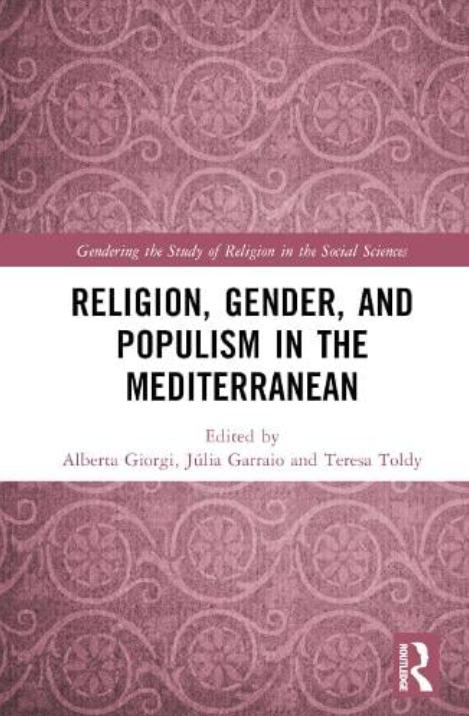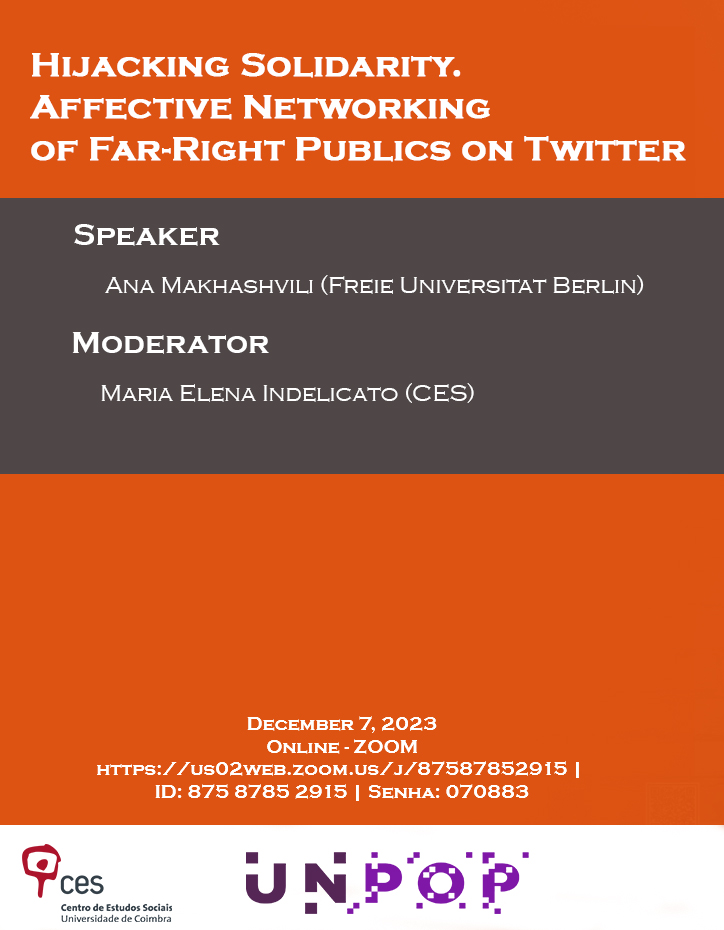«Religion, Gender, and Populism in the Mediterranean» | Ed. Alberta Giorgi, Júlia Garraio and Teresa Toldy
Discussants:
Cristiano Gianolla (CES – University of Coimbra)
Manuel Anselmi (University of Bergamo)
Maria Elena Indelicato (CES – University of Coimbra)
Participants:
Alberta Giorgi (University of Bergamo)
Júlia Garraio (CES – University of Coimbra)
Teresa Toldy (CES – University of Coimbra / University Fernando Pessoa)
December 7, 2023, 17h00 (GMT Lisbon/London)
This activity will be provided through Zoom platform and does not require registration. Participation is limited to the number of places available > https://zoom.us/j/89382013704 | ID: 893 8201 3704 | Password: 710115
Overview
Among the book authors: Adriana Zaharijevic (University of Belgrade), Amila Ždralović (University of Sarajevo), Alexandre de Sousa Carvalho (CES – University of Coimbra), Jadranka Rebeka Anić (Institute of Social Sciences Ivo Pilar – Regional Centre Split), Nahed Ashqar-Sharary (NYU), Sarab Abu-Rabia-Queder (Ben Gurion University), Sofia José Santos (FEUC/CES – University of Coimbra), Zlatiborka Popov-Momčinović (University of East Sarajevo)
The book Religion, Gender, and Populism in the Mediterranean, edited by Alberta Giorgi, Júlia Garraio and Teresa Toldy (Routledge, 2023), proposes a systematic and comparative analysis of the intersections of religion and gender in times of populism across the EU-Mediterranean. The chapters explore tensions and issues related to religion and gender in nations including Portugal, Italy, Croatia, Bosnia-Herzegovina, Serbia, Greece, Turkey, and in the case of Palestinian women. Shifting attention from the European Union to the Mediterranean area allows the inclusion of countries whose history is significantly interwoven, taking into account the legacies of colonialism, the effects of post-colonialism, and the role of the EU in relation to gender-related issues in particular. The volume investigates not only country-specific cases but highlights similarities and differences in the region and aims to understand how the interconnections influence the issues at stake. It draws together countries with non-Christian majoritarian religions, with different political regimes, and where feminism and women’s movements have different shapes, histories, and relationships with religion.
The chapters of the book are authored by Júlia Garraio, Teresa Toldy, Alexandre de Sousa Carvalho, Inês Amaral, Sofia José Santos (chapter about Portugal), Alberta Giorgi (chapter about Italy), Jadranka Rebeka Anić (chapter about Croatia), Adriana Zaharijević, Zorana Antonijević (chapter about Serbia), Zlatiborka Popov-Momčinović, Amila Ždralović (chapter about Bosnia-Herzegovina), Chara Karagiannopoulou, Niki Papageorgiou (chapter about Greece), Bilge Yabanci, Chiara Maritato (chapter about Turkey), Nahed Ashqar-Sharary and Sarab Abu-Rabia-Queder (chapter about Palestinian women).
The book launch includes short inputs from the editors of the book and some authors of the chapters and comments by Cristiano Gianolla, Maria Elena Indelicato and Manuel Anselmi.
Activity organized by the CES working group Policredos – Religions and Society and the University of Bergamo in collaboration with the CES project UNPOP – UNpacking POPulism: Comparing the formation of emotion narratives and their effects on political behaviour (series: Populism and Emotions) and the GPS-CES working group.
Bio notes
Ana Makhashvili is a doctoral researcher in Media and Communication Studies working at the collaborative research center “Affective Societies” at the Freie Universitat Berlin, Germany. From 2019 till 2023, she worked on the project ‘Journalism and the Order of Emotions’, where she analyzed the Twitter discourse around refuge and migration in Germany and now continues her research as part of the project “Contested Order of Emotions: (Anti-)Feminist Discourses on Social Media”. In her dissertation, she combines qualitative, quantitative, and automated methods to examine the role of emotions and affect in the formation of far-right publics on Twitter. Her latest publications include ‘Hijacking Solidarity: Affective Networking of Far-Right Publics on Twitter’ (Affective Formation of Publics. Places, Networks, and Media, 2023) and ‘Challenging Journalistic Authority in the Networked Affective Dynamics of #Chemnitz’ (with D. Medeiros and M. Lunenborg, Social Media + Society, 2022).
Maria Elena Indelicato (she, her, hers) is a CEEC FCT researcher at the Centre for Social Studies (CES), University of Coimbra and University of Münster Visiting Scholar at the Department of English. She is also an associate editor of the Journal of Intercultural Studies, and co-editor of the section ‘Anti-Racism/Mobilisations and Resistance’ of the forthcoming online Routledge Encyclopaedia of Race and Racism, and team member of the FCT group project UNPOP. Besides her monograph Australian New Migrants: International Students’ History of Affective Encounters with the Border (2018), Indelicato has published in feminist, critical race and cultural studies journals such as Outskirts: Feminisms along the Edge, Critical Race and Whiteness Studies e-Journal, Chinese Cinemas, Inter-Asia Cultural Studies, Paedagogica Historica, Transnational Cinemas, Feminist Review, Postcolonial Studies, and Interventions. International Journal of Postcolonial Studies besides several chapters in edited books on migration, settler colonialism, and Chinese cinemas.



